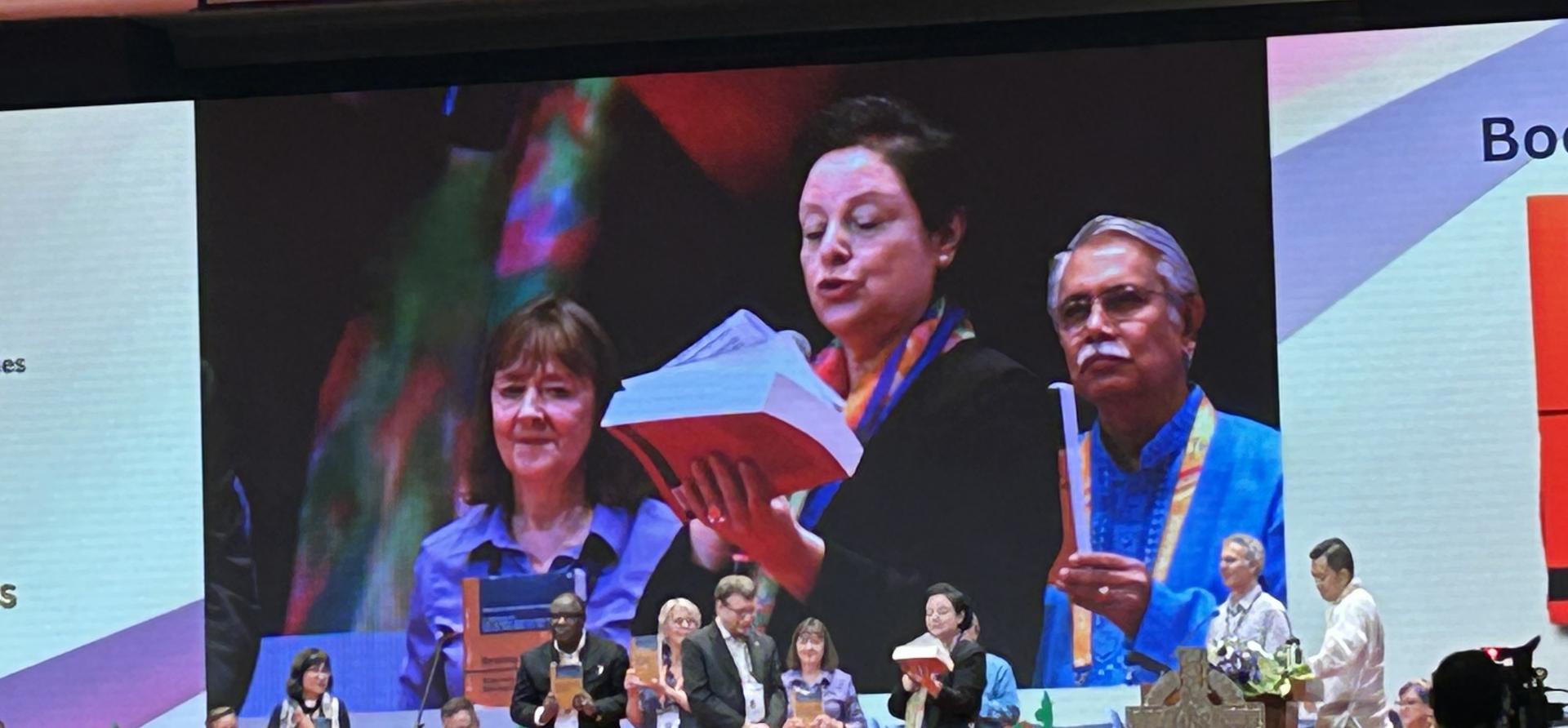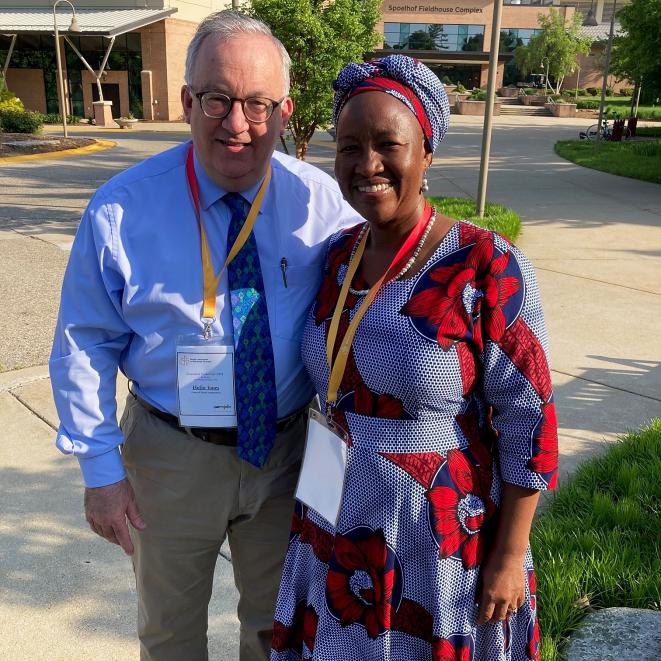General Council of the World Communion of Reformed Churches, Chiang Mai, 14–23 October 2025
It was a great privilege for the Reverend Beti-Wyn James and I to represent the Union of Welsh Independents at the General Council of the Community of Reformed Churches of the World, in Chiang Mai, Thailand during the month of October. Beti-Wyn diligently created a daily blog of comments and photos that appeared daily on Facebook; without doubt, these managed to convey some excitement, enjoyment and the blessing of the Council. Two weeks after returning I threw a trem back on nine days that we will both remember and reflect on for a long time.

The Communion
The World Communion of Reformed Churches was formed in 2010, at Calvin College, Grand Rapids USA, by merging the Alliance of Reformed Churches of the World and the Reformed Ecumenical Council. The Reverend Dr Geraint Tudur, General Secretary of the Union of Welsh Independents at the time, and I were at that meeting and Geraint was one of the signatories of the founding document. The Communion represents over 100 million Christians in 230 churches and church unions across 108 countries. Rooted in the reformed tradition of the 16th century Protestant Reformation, the Communion includes Congregational, Presbyterian, Reformed and United churches. The Community promotes Christian unity and social justice, actively engaging with global issues such as climate change, human rights and economic inequality. Through all its mission work the Communion emphasizes theological reflection and prophetic action. The organization traces its origins to 1875, reflecting a long-standing commitment to fostering communion among Reformed Christians. Since 2017, it has been a great privilege for me personally to have been able to contribute to the work of the Community by being one of the 24 members of its Administrative Committee.
What then remains in the memory?

The President’s Address
one of the highlights of the Council was the President’s Address on the theme of the meeting ‘Persevere in your Evidence’. Amid global crises – climate change, war, inequality, and technological disruption – the Church is called to remain steadfast and hopeful. Drawing on the Biblical concept of hupomonē, a Greek word that means active endurance, Reverend Najla Kassab, President of the Community since 2017 and an ordained minister in the National Evangelical Church of Syria and Lebanon, encouraged us to continue in our mission of justice and reform. Referring to the celebration of 150 years of testimony, he reflected on the resilience of the Communion and its predecessors in surviving challenges such as the pandemic, financial crises, and leadership changes. He spoke of the Accra Confession which, despite being over 20 years old, is still a guiding document for confronting economic and ecological injustice. He highlighted the humanitarian crisis in Gaza as a call for prophetic testimony and sympathy. He emphasized regional collaboration and ecumenical partnerships as essential features to the strength of the Community. He finished the talk turning to the art of Kintsugi, the Japanese art of repairing broken pottery with gold. This symbolizes how the Church’s challenges and weaknesses can be transformed into beauty through God’s grace.
Workshops
The first two days were spent attending workshops; these tackle pressing global issues and analyze them through a faith-based lens. Beti-Wyn and I have been in a number of different workshops. A workshop, Justice in the Economy and the Earth, focused on exploring ecological collapse and inequality, advocating for tax justice and debt cancellation through the New International Financial and Economic Architecture (NIFEA; an initiative that the Union and its Council have considered in considerable detail). It was eye-opening to attend the Myanmar Workshop and learn about the protracted conflict and economic hardships facing the country.
Another workshop focused on Disability Inclusion encouraging churches to move beyond compassion and embrace justice, accessibility, and positive theology for people with disabilities. A subject that is always controversial and so it was this time too when Faith as a Weapon of Empire was discussed. Here there was a treatment of how religion is used to justify authoritarianism, the worship of capital, and social oppression.
The workshop on Indigenous People sought to amplify the concerns of Indigenous brothers and sisters, encouraging churches to listen, learn, and support justice efforts. It was quite an eye-opener to listen to the experiences of siblings from the Pacific Islands, North American Indians, and residents of Northern Scandinavia. I found inspiration in the discussion on Mission in Crisis as we set out to redefine mission as divine resistance, calling churches to respond meaningfully to global oppression in places like Gaza, Myanmar, and Ukraine. The experience was similar when discussing Peace Implementation in Korea. How do we promote reconciliation and peace on the Korean Peninsula? The global significance of the situation and the role of the church in fostering democracy and human rights were emphasized. We both attended the workshop on the Onesimus Project. We knew about this from our involvement with the work of the Union and we were led to a very special orig by a friend of both of us, the Reverend Roderick Hewitt from Jamaica, as he discussed how best to face the legacy of slavery and colonization, advocating for restorative justice and relationships transformed through dignity and justice.
Over these first two days, while I was attending a number of administrative and business meetings of the Administrative Committee, Beti-Wyn played a prominent role in the Women’s Caucus Group which discussed ‘Her Own Voice, Our Witness’. From chatting with Beti-Wyn and hearing the group’s report it was emphasized the essential role of women’s voices in the Church’s witness in the midst of global crises such as war, ecological crisis, and religious nationalism. Drawing inspiration from Hebrews 12:1, the Caucus confirmed that the testimonies of women - who were once on the margins - are central to the Church’s quest for justice and love. Four themes were explored by the women: ecological and climate justice from a feminist perspective, women’s experiences in war and militarism, feminist Christian education, and structural transformation in church leadership. The Caucus also considered the content of the Gender Audit report, drawing attention to issues of leadership and equality in churches, and promoting feminist Christian education through contextual Bible study and ritual. The aim of these methods is to challenge patriarchy and foster inclusive church practices.
Biblical Studies
Without a doubt, we doubt the Bible Studies we have received. It is impossible to recount all the references, reflections and theological questioning of the series of Studies that we had the privilege of sharing. Two studies remain in my mind. The first by Miriam Spies which was a theological reflection rooted in disability justice. Spies, a crip theologian, set out to reclaim the term ‘crip’ to challenge the norms of ableism and interpret Scripture through the lens of marginal embodiment. Focusing on Luke 22, he criticized the way the disciples were turned towards violence in the garden of Gethsemane and drew attention, instead, to Jesus’ healing of a slave’s ear as an act of reparation. She went on to consider how empires devalue bodies – disabled, racialised, indigenous – through systemic violence, eugenics and environmental degradation. By turning to theologians such as James Cone, Nancy Eiesland and Dietrich Bonhoeffer, he argued that the broken, resurrected body of Jesus confirms the sanctity of all bodies, especially those considered expendable. The concept of ‘Christ for me’ emphasizes Jesus’ solidarity with the oppressed.
Spies was very critical of ‘supercrip’ narratives that celebrate disabled individuals only when they overcome adversity, reinforcing ideals of ability. Instead, he called for a ‘crip future’ – visions of justice where disabled bodies are desired and valued. The church, he said, as the community of Christ, must cultivate righteous relationships and resist a sanitized theology that erases physical reality.
The second reflection that captured my imagination was that by Jione Haveaar Food and Talanoa in Witness, exploring Pacific customs and traditions of intertwining food sharing and Talanoa – storytelling, narration, and conversation – as a central focus for community life and theology. Talanoa is not just a method but a living cultural practice that shapes identity and relationships. It encompasses narrative, the act of telling, and the community discussion around stories, emphasizing that no story is isolated or neutral. Havea linked Talanoa to theology, arguing that both are political, intersectional, and continuous. It opened our eyes to read the Gospel story about Jesus feeding the multitudes (Matthew 14 and 15; John 6) through the lens of the Pacific, highlighting relevance and balance over capitalist ideas of transactions and wealth. In Pacific culture, food is relationship finance, and events such as feasts are community endeavors where everyone contributes, no matter how small the contribution.
We were led to reinterpret the feeding miracles and to emphasize the contributions of anonymous individuals – especially the boy in John’s story with the likelihood that his family prepared the food for him, the unspeakable family. This challenges dominant narratives and invites recognition of invisible participants. The abundance to feed the crowd, and the leftovers in the stories symbolize sustainability and wisdom (fakapodono), encouraging communities to value small contributions and share resources. Havea’s criticism was the lack of recognition and balance towards the boy and his family, encouraging the retelling of the stories to restore relevant justice.
Celebrating 150
During the Council the Community celebrated its 150th anniversary with a special and unique service. Exciting music, a colorful ceremony, and heartfelt preaching were combined, creating an atmosphere of joy and unity. From the outset, the service showed global diversity, with four different versions of ‘Hallelujah’ from the Caribbean, the United States, Palestine and Syria. The litany of ‘Remembering Our Story’, led by young adults, called us to honor generations of faithful witnesses. I was excited when I heard exactly a century ago at the 12th General Council of the ‘League of Reformed Churches practicing the Presbyterian System’, the predecessor of the Communion, in 1925, in Cardiff, here in Wales, that that unique theologian from Switzerland, Karl Barth, had addressed, and called on the Alliance to move from being a confessional body to acting as a confessing body: ‘We, here, now, are confess this.’ We must search out more about this meeting!
Prominent voices reflected on the journey of the Communion. The Reverend Dr Allan Boesak emphasized God’s faithfulness as a source of courage, while Professor Jane Dempsey Douglas expressed gratitude for decades of ecumenical collaboration. From Indonesia, Reverend Dr Kadarmanto Hardjowasito called for continued reform and advocacy for justice and care for creation. The current president encouraged trust in the Spirit’s guidance for future mission. Music played a central role, a stage full of Christians in Chiang Mai’s presentation of ‘Mor fwr wyt ti’ with extremely dramatic drumming will not be forgotten overnight. The Reverend Dr Jerry Pillay, Secretary General of the World Council of Churches, preached on Hebrews 12:1–2 challenging us as believers to maintain hope in the midst of global crises. He confirmed that God’s justice and love will ultimately prevail.
I will not forget one act of humility. The foot washing ritual between Reverend Dr Setri Nyomi, General Secretary of the Community, and Reverend César García, General Secretary of the Mennonite World Conference, embodied reconciliation and mutual learning. Even the offering became a joyful dance as we as worshipers jigged to the front of the hall to contribute while singing the Zulu hymn ‘Hamba Nathi’. The day ended with a community feast organized by the Church of Christ in Thailand, all reinforcing the theme of shared joy and gratitude. As Nyomi pointed out, ‘What is a family celebration without eating together?’ This anniversary service was more than a commemoration – it was a testament to enduring faith, global unity, and a new commitment to justice, peace and love.
Out in the community
We had one day of travel to visit different locations. Without knowing each other, Beti-Wyn and I chose the same spot! The Huai Hong Khrai Royal Development Study Centre was established in 1982, by the King, to tackle the severe deforestation, drought and forest fires seen in the area. The Centre’s main mission is to research and implement sustainable development models that promote environmental conservation and self-reliance among farmers. The Centre’s key initiatives include restoring forests by growing trees for four benefits – economic, fruit, firewood, and soil-water conservation. The Centre also focuses on managing watersheds using irrigation systems, rainwater, dams and wet firebreaks to maintain soil moisture and prevent fires.
The Centre operates as a one-stop service for interdisciplinary research, experimentation and demonstration, enabling farmers to adopt sustainable practices. Its objectives include the study of water resources, forestry, soil and ecological agriculture, all funded by the King. The Centre also serves as a focus of information and promoting self-reliance through the philosophy of an Economy of Sufficiency. It also works to protect natural resources and develop water basin management systems.
Since its establishment, the Centre has completed infrastructure projects and ongoing research activities, disseminating results to local communities and government agencies. One notable achievement is the forestry project, which improved the quality of the soil from sandstone to nutrient-rich humus. Agriforestry studies include 20 plant species such as pepper and fruit trees. In addition, the Centre supports animal husbandry (although Beti-Wyn was not too fond of frog farming!), distributes seeds, and provides technical guidance to farmers. Its success lies in infrastructure development, research, and collaboration among government agencies, contributing to sustainable livelihoods and environmental conservation in the region.
Keynote speakers and discussions
Powerful speeches were given by a number of eloquent speakers. Their task was to explore the crossroads of justice, faith, and the evolving role of the church in today’s world. Allan Boesak emphasized that Christian mission is rooted in the injury caused to God by injustice. He described the present age as one dominated by violent imperial power and pointed to Palestine as a key measure of political and spiritual integrity. He called for brave and vulnerable conversations that challenge the status quo and reflect the disruptive mission of Christ. Dr Janneke Stegeman criticized the church’s acquiescence in systems of oppression, particularly colonial Protestantism which she argued perpetuated white supremacy under the guise of neutrality and universality. He questioned whether the church is prepared to disrupt its own structures in the pursuit of justice, especially in light of global conflicts such as Gaza.
Discussing the rise of artificial intelligence (AI), Roderick Hewitt warned that the church’s response to the ‘imperial global DA system’ has been passive. DA’s unfettered growth became associated with unfettered capitalism and white supremacy, encouraging a radical discipline to confront the forces. Finally, Inatoli Aye, representing the Indigenous Naga community (India), shared how her people embraced Christianity through their own agency, rather than through missionary influence. He emphasized that mission must learn from indigenous experiences, recognizing that God exists beyond the walls of churches. Aye called for reform led by those who were historically silenced, envisioning a communion where justice prevails and all creation flourishes. Together, the speakers challenged the church to reimagine its mission as one of disruption, justice, and listening deeply to marginalized voices.
Scrutiny and consensus
Following the speeches we had the opportunity as representatives to discuss. That, firstly, in small groups and then as a whole Council. Decisions are made by consensus rather than a vote (when it was established the Community only votes on financial and constitutional matters). Include in the scrutiny process aspects of listening, insight, drafting and decision making. Representatives are given orange and blue cards; orange indicates agreement and blue indicates disagreement or a call to continue the discussion. Decisions are agreed by consensus when there is unanimous agreement or when those who have indicated disagreement feel that their views have been sufficiently heard and discussed and they acknowledge that they are happy to move on. In practice, this did not always work out. On most topics, the Council agreed by consensus but there were a handful of topics that came up again and again that caused disagreement – Palestine, Christian Zionism, gender and sexuality.
The penultimate day was difficult with many of the topics leading to a failure to reach a consensus. Many left the hall feeling that the statements did not go far enough and others left feeling that they had been dismissed and that they had not been heard. Perhaps understandably after nine days of discussions, workshops, trips and decision making, we were all tired, ready to go home, and ready to wrap up the Council’s business.
Something quite amazing happened on our last day. A miracle? Statements were completed and amended with ease compared to previous days. We gathered together around the Lord’s Table for our communion service. I can only speak for myself but this service was extremely beautiful, and its beauty was blessedly exciting. There was a real feeling of the joy of the Lord as we shared the peace together and as delegates joined a conga line around the full hall singing together ‘come walk with us, the journey is long’ and ‘we march in the light of God.’ There is a long journey ahead of the Communion but as we walked out of the huge hall in Chiang Mai all of us I suppose knew that our next step would be getting enlightened by God: ‘your word is a lamp to my feet, a light on my path.’ (Psalm 119:105)
PS: A personal word to finish. With this Council in Chiang Mai, my period as a member of the Administrative Committee of the World Communion of Reformed Churches came to an end. It is impossible for me to adequately express my gratitude to the Union of Welsh Independents for nominating me back in 2017, in Leipzig, Germany, to be one of the 24 members. It was an absolutely amazing and unique time. I developed and grew as a Christian, my horizons were broadened and I had the privilege of making new friends all over the world. I owe a lot to the Union and the Community. Thank you!





